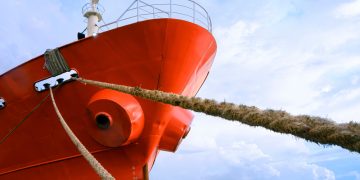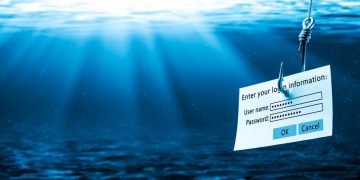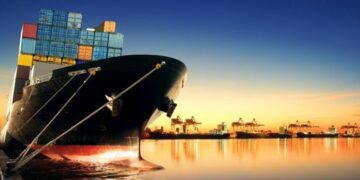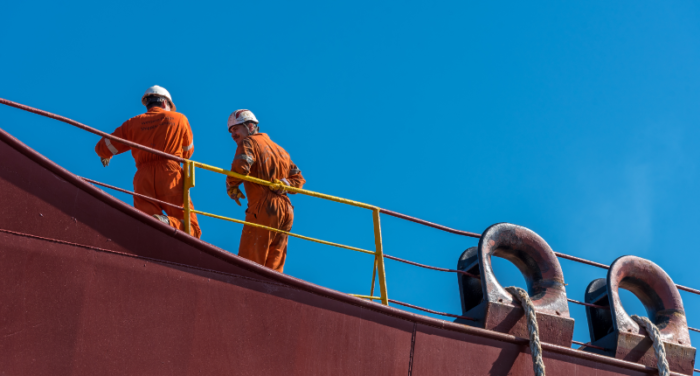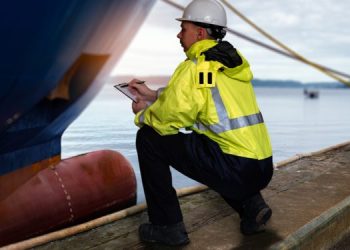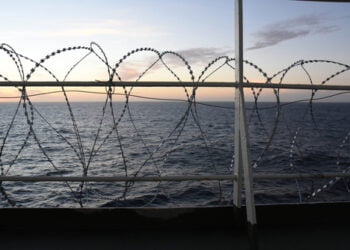Every 40 seconds, someone in the world loses their life to suicide, a figure which could justify a global interest in a greater awareness on mental health issues. On the occasion of the World Mental Health Day 2019 celebrated today, the World Health Organization sheds a focus on suicide prevention, an issue which seems to be gaining more attention in the maritime world, in light of a recent study indicating that 5.9% of all deaths at sea were proven suicides.
The World Health Organisation recognizes World Mental Health Day on October 10th every year, with the overall objective of raising awareness of mental health issues around the world and mobilizing efforts in support of mental health.
What is the problem?
It was in late February of this year, when a shocking image of a seafarer’s suicide made headlines in social media, making the industry to think bigger on issues related to crews’ mental health.
The publishing of such an image, which has understandably provoked criticism, highlights just one case of many that go unreported around the world every year,
…said Sandra Welch, deputy CEO of Sailors’ Society and the figures seem to assure this statement.
In 2017, the UK P&I Club put seafarer mental health in the spotlight, revealing that suicide was the top cause of seafarers’ deaths, accounting for 15% of deaths at sea.
Additionally, according to a study from the International Maritime Health journal, an estimated 5.9% of deaths at sea are connected to suicide.
Yet, when ‘suspicious’ deaths that were probably suicides were included, the percentage increased to 18.3%, added Captain Rajesh Unni, CEO and Founder of ship manager Synergy Group.
In the shipping world, mental health issues relate to the nature of seafarers’ job which is characterized not only by intensive work hours, but also by isolation, being away from family for too long, fatigue, and many others. In the second quarter of 2019, seafarers’ happiness marked a 6.27/10, down from 6.31 in the previous quarter, according to the Seafarers Happiness Index launched by the Mission to Seafarers and Shipowners Club.
A report earlier this year identified that seafarers are amongst occupational groups with the highest risk of stress. While stress and anxiety affect a lot of people, their impacts could be more severe to seafarers due to the nature of their work. Let us not forget that seafarers are not going home at the end of working day!
Key facts on suicide globally
- Close to 800,000 people die due to suicide every year.
- For every suicide there are many more people who attempt suicide every year. A prior suicide attempt is the single most important risk factor for suicide in the general population.
- Suicide is the second leading cause of death among 15-29-year olds.
- 79% of global suicides occur in low- and middle-income countries.
- Stigma is considered an important risk factor, as it means many people thinking of suicide are not seeking help and are therefore not getting the help they need.
Top factors affecting wellness at sea
-Social interaction onboard: Many maritime health-related researches have highlighted lack of social interaction as a key factor of seafarers’ mental health issues, while active engagement in social life onboard is considered to have a real and positive impact on their welfare. Nationalities and different cultures have different ways of socializing, so companies should adopt new ways to encourage socializing of crews onboard. For example, introducing alcohol restrictions instead of alcohol bans, and arranging team activities like basketball or karaoke, are some of the things that can make people onboard create relationships, argued Mr. Yves Vandenborn, Director of Loss Prevention at Standard P&I Club, at the latest SAFETY4SEA Conference in Athens.
-Connectivity onboard: Friend or Foe? Shipboard connectivity is a constant focus for seafarers, given that they are away from their people for long periods of time. Crews are generally critical of companies who either do not provide internet or call access, or who make it expensive or low quality. On the other hand, having Internet accessible everywhere onboard can be considered as a key factor of isolation, as it can encourage seafarers staying in their cabins and ignore the opportunities of spending quality time with each other. Making WiFi accessible to only certain common areas instead of cabins, could be the ideal solution, according to Mr. Vandenborn.
-Food and exercise: Mental wellbeing is vastly related to physical wellbeing. You might be unhappy and be in good physical condition, but you cannot be happy if you are in bad physical condition. Recent diet statistics show an overwhelming 64% of seafarers are overweight and surveys reveal that crews consider food important in order to be happy.
-Shore leave: Decreased shore leave was a key issue identified in the latest Seafarers Happiness Index. Time constraints, workload stress and commercial pressures are key impeding factors for crews’ shore leave. This can be summarized in the word of one seafarer who responded, “Shore leave is dead…”.
People need a break from their work environment, and so seafarers need to feel able to take time out too.
-The Seafarers Happiness Index
-Fatigue: Fatigue can trigger sadness and vice versa. Heavy workloads are a typical feature of the nature of seafaring as a job. Emotional exhaustion can arise when someone experiences a period of excessive stress in their work or personal life. Constantly feeling tired, overwhelmed, or unable to focus are signs of mental fatigue. The most common symptoms include mental block, lack of motivation, irritability, stress eating or loss of appetite and insomnia. Find a ‘Fatigue Self-assessment Tool’ here.
-Insecurity: “You don’t have to be attacked by pirates in order to be mentally affected by piracy,” noted Steve Regis, COO, ARX Maritime, explaining that the threat of attack by pirates and related stories from sailors that have survived them trigger a tangible level of fear and horror amongst the crew every time they sail into pirate infested waters.
Actions taken
The shipping industry has increased its focus on seafarers’ mental health in the last years, referring to the major human and financial risks that could arise in case a seafarer had a mental health crisis while on duty:
- The ITF has commissioned the Yale University to carry out a research investigating seafarers’ mental health issues and understand which risk factors are associated with seafarer stress, depression and anxiety.
- North P&I Club has presented its new ‘Mind Matters’ campaign, aiming to raise awareness of mental health and wellbeing at sea. The campaign includes a confidential helpline for crew, in partnership with ISWAN. The Mind Call team speaks several languages, while seafarers can access the helpline through email and live chat.
*On World Mental Health Day 2019*
- ‘40 seconds of action campaign’
On 10 September, WHO, in collaboration with the World Federation for Mental Health, the International Association for Suicide Prevention and United for Global Mental Health, launched the ‘40 seconds of action campaign’, in a bid to raise awareness of the scale of suicide around the world and the role that each of us can play to help prevent it. The culmination of the campaign is on World Mental Health Day, 10 October.
- ‘Mindfulness for the Maritime Industry’ briefing note
On the occasion of 10th October, Human Rights at Sea, in partnership with author and mental health coach, Gillian Higgins, published the briefing note ‘Mindfulness for the Maritime Industry‘, sharing the benefits of mindfulness practicing and how to get started. Research shows that our minds wander 46.9 per cent of the time, and that a wandering mind is for the most part, an unhappy one.
Mindfulness encourages us to witness the essence of the moment, just as it is, so we don’t miss out on what’s going on, right now.
Although mindfulness is simple, the hard bit is remembering to do it. It can be practised anywhere – on land or sea, at any time of the day or night.
One way is to learn mindfulness meditation, by using a point of focus, such as the passage of your breath.
When your mind gets distracted and wanders off into thinking, worrying, or planning, simply notice where it has wandered to and gently guide it back to following the physical sensation of the in-breath and the out-breath. Do this every time the mind wanders – with kindness to yourself. With practice, you recognise that thoughts are not facts and will come and go of their own accord, if you allow them to do so.
Find a SAFETY4SEA Infographic on mindfulness here.
What to do – Top 5 recommendations for seafarers
- Talk: Discuss your problems and spend quality time with your crew mates.
- Observe: Is your crew mate nervous, less talkative, more irritable or aggressive? This could be a mental issue sign.
- Care: Ask your crew mates how they are and share your concerns. Inform them about your experiences to let them know they are not alone.
- Rest, eat, exercise: Physical wellbeing is the A and Z to mental wellbeing.
- Distract yourself: Take your mind off your worries by keeping busy and finding something else to do.
Look after your mental and physical health and develop your career. Use the techniques of mindfulness to help you adopt a healthy mental attitude, develop resilience to enable you to cope with difficult issues, nurture and treasure personal relationships and friendships,
…was the key message by Mr. Ray Barker, Head of Operations, ISWAN to young seafarers in an exclusive interview with SAFETY4SEA.
Did you know?
- September 10 marks the official World Suicide Prevention Day (WSPD).
- Since 2002, ISWAN has established SeafarerHelp, a free, confidential, multi-lingual helpline that is available to any seafarer 24 hours per day, 365 days per year. The helpline can be contacted by Telephone, Email, Live Chat, Facebook, WhatsApp, Viber, VK.com and SMS text.
- Sailor’s Society launched ‘Not On My Watch’ campaign calling maritime companies to donate to the charity’s work with seafarers struggling with depression and to run wellness training for their staff. As part of the campaign, Sailors’ Society petitioned the ILO to make wellness training for seafarers mandatory in the Maritime Labour Convention (MLC).
- In early 2018, a survey to more than 1000 seafarers by Yale University and the Sailor’s Society showed 26% of seafarers had felt “down, depressed or hopeless”.
- The latest Seafarers’ Happiness Index showed the 16-25 age group tended to be the happiest, with those in the 25-35 age range being the least satisfied. Among the key issues emerged in the survey was a lack of understanding from shore staff regarding seafarer welfare issues.
- Synergy Group has launched ‘iCall’, a free and confidential chat and phone based multilingual psychological helpline for the worldwide maritime community, for which it has received the SAFETY4SEA Technology Award 2019, sponsored by Diaplous Maritime Services.







